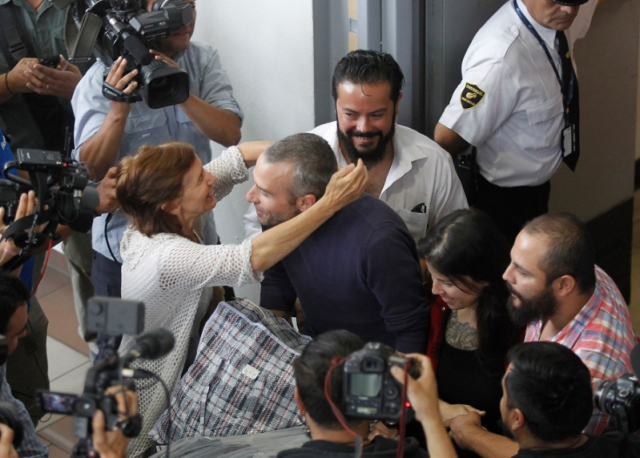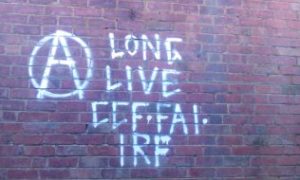Γράμμα από τους αιχμάλωτους αναρχικούς συντρόφους Monica Caballero και Francisco Solar ( Ισπανία ) [1]
Στη διάρκεια των περίπου τριών ετών που βρισκόμαστε έγκλειστοι σε διαφορετικές φυλακές του ισπανικού κράτους,υπάρχει ένα στοιχειο που χρίζει ειδικής προσοχής λόγω της αποφασιστικής του σημασίας στη ζωή της φυλακής:αναφερόμαστε στη διασπορά.
Η διασπορά αντιστοιχεί σε μια πολιτική των Σωφρονιστικών θεσμών που εφάρμοσε η σοσιαλιστική κυβέρνηση στα μέσα της δεκαετίας του 1980,η οποία περιλαμβάνει μεταγωγές αποφασισμένων φυλακισμένων σε μακρινές φυλακές, πολλά χιλιόμετρα από τον τόπο κατοικίας τους.Σε πολλές περιπτώσεις αυτές οι μεταγωγές είναι ασταμάτητες και βρίσκουν τους φυλακισμένους αναγκασμένους να περάσουν απο διάφορες φυλακές σε μικρό διάστημα αποτρέποντας τους από το να εγκατασταθούν και να δμιουργήσουν σχέσεις διάρκειας με άλλους.Ο σκοπός αυτής της πολιτικής ήταν να χαλιναγωγήσει τις ταραχές και τις διαμαρτυρίες μέσα στις φυλακές που συνέβαιναν στη διάρκεια αυτών των ετών απομακρύνοτας δραστικά έγκλειστους που θεωρούνταν εχθρικοί προς το σωφρονιστικό σύστημα.
Απο την άλλη πλευρά η διασπορά εφαρμόστηκε σε όλους τους πολιτικούς κρατούμενους ως ένα ειδικό μέτρο για να επιδεινώσει την ποινή τους,οι μεταφορές επίσης επηρέασαν τους κοντινούς τους ανθρώπους οι οποίοι αναγκάστηκαν να ταξιδεύουν εκατοντάδες μίλια για να μπορούν να επισκέπτονται ένα συγγενή ή φίλο στη φυλακή.Συνεπώς,από την έναρξη της, η τακτική της διασποράς επηρεάζει και κοινωνικούς[2] και πολιτικούς κρατούμενους, και συνεχίζει να το κάνει,αντίθετα με πολλούς που θεωρούν και διατείνονται οτι εφαρμόζεται αποκλειστικά σε “πολιτικούς”.Η διαφορά έγκειται, όπως δηλώσαμε, ότι για τους τελευταίους είναι ειδικό μέτρο που τους επηρεάζει όλους και μονο για το λόγο που οδήγησε στη φυλάκιση τους,ενώ εφαρμόζεται σε ποινικούς κρατούμενους για συγκεκριμένες συμπεριφορές μέσα στη φυλακή που θεωρούνται ενοχλητικές για τη “σωφρονιστική τάξη”. Είναι σημαντικό να σημειωθεί ότι η διάκριση μεταξύ ποινικών και πολιτικών κρατούμενων δεν χρησιμοποιείται απο εμάς,παρ’ όλα αυτά είναι η κατασκευή αυτής της κατηγοριοποίησης που κάνει ικανή τη δόμηση και τη λειτουργία του μέτρου για το οποίο γίνεται λόγος.
Η διασπορά είναι ακόμη όσο διαδεδομένη ήταν στις απαρχές της. Δεν υπάρχει αμφιβολία ότι έχει ικανοποιήσει μέρος του σκοπού της να ειρηνέψει τις φυλακές του ισπανικού κράτους όπου οι απαιτήσεις και οι διαμαρτυρίες είναι σχεδόν ανύπαρκτες και στις οποίες περισσότερο από ποτέ υπάρχει μια στενή συνεργασία μεταξύ έγκλειστου και φύλακα. Μπορούμε να δούμε πόσο η φυλακή είναι αντανάκλαση της κοινωνίας. Η διασπορά έχει επηρεάσει τόσο τη ζωή στη φυλακή που η απειλή της μεταφοράς σε άλλη φυλακή είναι μονίμως στο μυαλό κάθε τροφίμου. Είναι μια συνεχής απειλή που σιωπηλά κανονίζει και ελέγχει τη συμπεριφορά των ανθρώπων εδώ σε τέτοιο βαθμό ώστε κάθε συμπεριφορά που αναστατώνει την “τάξη” και εκδηλώνει κάποια πρόθεση να τιμωρείται με μεταγωγή. Έτσι, η όποια ρηξικέλευθη πρωτοβουλία ακυρώνεται από αυτό το εργαλείο ελέγχου, ο μεταφερθείς κρατούμενος πρέπει να ξεκινήσει να αναπτύσσει νέες σχέσεις και συνδέσεις έως ότου προειδοποιηθεί από τους φύλακες ότι θα υποστεί νέα μεταγωγή. Σήμερα υπάρχουν κρατούμενοι που, λόγω των όρων των σωφρονιστικών θεσμών, δε μένουν για πάνω από ένα χρόνο σε κάθε φυλακή, κυρίως εξαιτίας του συγκρουσιακού ιστορικού τους.
Παρά το γεγονός ότι στο ξεκίνημά της η διασπορά εφαρμόσθηκε στους κοινωνικούς κρατούμενους που συμμετείχαν και ενθάρρυναν τις διαμαρτυρίες και τη ρήξη στο εσωτερικό των φυλακών , στις μέρες μας αφού αυτές οι πρωτοβουλίες είναι σχεδόν ανύπαρκτες, το σωφρονιστικό σύστημα χρειάστηκε να προσαρμοστεί στην τρέχουσα κατάσταση και πλέον έχει αρχίσει να εφαρμόζει αυτό το μέτρο σε κάθε επαναλαμβανόμενη ή μη, συμπεριφορά που σπάει τα εσωτερικά πρότυπα, χωρίς να λαμβάνει υπόψιν το μέγεθός της. Παραπτώματα για τα οποία οι κυρώσεις στο παρελθόν ήταν ήπιες, έχουν πλέον ποινικά αναβαθμιστεί , για παράδειγμα στην περίπτωση που κάποιος πιαστεί με ένα κινητό τηλέφωνο ή εμπλακεί σε μία μικρή μάχη.
Σχετικά με τα παραπάνω, ένα στοιχείο που έχει αποκτήσει μεγάλη σημασία είναι οτιδήποτε αφορά τη συμπεριφορά του κρατουμένου, μετατρέποντάς τον σε ένα πραγματικό όργανο του συστήματος των φυλακών. Στο ισπανικό κράτος υπάρχουν περίπου 80 φυλακές, μερικές από τις οποίες είναι μόνο γυναικείες, πολλές ανδρικές, κάποιες μικτές, αλλά και κάποιες ειδικά διαμορφωμένες για τις μητέρες. Συνεπώς, οι επιλογές για τη διενέργεια των μεταφορών είναι ποικίλες και ανεπίσημες , χωρίς να υπολογίζουν το κόστος για τη διεξαγωγή τους. Αν τους ενδιαφέρει να σου δώσουν μια καλή τιμωρία, δεν έχουν ενδοιασμούς να σου χαρίσουν μια καλή περιήγηση στο άλλο άκρο της χερσονήσου. Οι φρουροί ασφαλείας , που έχουν επομιστεί τις μεταφορές είναι άντρες της guardia civilia [3], είναι υπεύθυνοι για τις μεταφορές από φυλακή σε φυλακή. Ίσως κάποιος που διαβάζει αυτό θα αναρωτηθεί τι είναι η μεταφορά. Η κάθε μεταφορά μπορεί να διαφέρει ανάλογα με τη γεωγραφική θέση, αλλά κατά βάση ακολουθεί το ίδιο πρωτόκολλο. Μπορούμε να σας διαβεβαιώσουμε ότι κάθε κρατούμενος ο οποίος έχει περάσει αυτή την εμπειρία, θα συμφωνούσε μαζί μας ότι είναι αηδιαστική. Συνήθως θα σε μεταφέρουν από τη μια φυλακή στην άλλη οποιαδήποτε στιγμή και μερικές φορές χωρίς να γνωρίζεις την τοποθεσία μέχρι τη στιγμή που θα φτάσεις, διαδικασία που προκαλεί πολύ άγχος. Μέχρι να φτάσεις στον προορισμό σου, είναι πιθανό ότι θα σταματήσεις σε διάφορες φυλακές για μερικές ώρες ή και μερικές ημέρες, διαδικασία που ονομάζεται «διάβαση». Όταν είσαι σε αυτή την κατάσταση ,δεν μπορείς να έχεις περισσότερα από τα απολύτως απαραίτητα (ανάλογα με τις ιδιοτροπίες τις κάθε φυλακής). Τα μέσα μεταφοράς για τη μεταφορά ονομάζονται «καγκουρό», φορτηγά της Πολιτοφυλακής ,τα οποία αποτελούνται από εσωτερικούς θαλάμους, που έχουν χώρο για δύο κρατούμενους . Αυτοί οι θάλαμοι είναι πολύ ασφυκτικοί, δεν υπάρχει αρκετός χώρος για να κινηθείς, ούτε καν να σταθείς όρθιος και εκεί μπορείς να περάσεις μέχρι και έξι ή επτά ώρες . Είναι σημαντικό να σημειωθεί ότι υπάρχουν φυλακές που προορίζονται να είναι κέντρα μεταφοράς που είναι εξοπλισμένα με όλες τις απαραίτητες υποδομές για αυτό, όπως μεγάλες ενότητες για εκείνους που βρίσκονται υπό μετακόμιση, ειδικές θέσεις στάθμευσης για τα φορτηγά των αστικών φρουρών και άλλα. Η φυλακή του Valdemoro στη Μαδρίτη πληρεί αυτή τη λειτουργία για τους φυλακισμένους , και η φυλακή του Soto del Real είναι το μέρος από το οποίο η πλειοψηφία των κρατουμένων περνά κατά τη μεταφορά τους από το βορρά προς το νότο ή το αντίστροφο.
Όλα τα παραπάνω αναδεικνύουν την εμβρίθεια των μεταγωγών για τα ιδρύματα σωφρονισμού και φανερώνουν πως η διασπορά είναι θεμελιώδες εργαλείο, με καθαρά εκδικητική πρόθεση προς όλους τους έγκλειστους και όλες τις έγκλειστες που θεωρούνται μπελάς, αφού τους πλήττει με τρόπο ο οποίος έχει την μεγαλύτερη επίδραση πάνω τους: Απομακρύνοντας τους από τα αγαπημένα τους πρόσωπα ανεξαρτήτως αν είναι σύντροφοι, οικογένεια η φίλοι.
Κατ αυτήν την έννοια, μια όψη της διασποράς που εφαρμόστηκε σε μας ήταν το να μας κρατήσουν σε διάσταση, διατηρηθήκαμε σε απομόνωση για τους πρώτους 18 μήνες δίχως να συναντήσουμε ο ένας τον άλλο και δεν υπάρχει τίποτα που να αποτρέψει αυτήν τη κατάσταση από το να επαναληφθεί. Τα σωφρονιστικά ιδρύματα υποτίθεται παρέχουν πρόσβαση για επανασύνδεση μόλις οι κρατούμενοι μπορέσουν να “αποδείξουν” πως πρόκειται για μία στενή και σταθερή σχέση, μολονότι αυτή δεν είναι η συνήθης έκβαση αφού πολλοί κρατούμενοι θα ξοδέψουν μήνες η και χρόνια δίχως να αντικρήσουν τους στενούς τους συντρόφους η και έγκλειστους συγγενείς.
Όντας πίσω από τα κάγκελα η εγγύτητα με τους αγαπημένους σου είναι απαραίτητη, είναι κάτι πολύ σημαντικό σε συναισθηματικό επίπεδο όπως και η με κάποιον τρόπο ρήξη με την συνθήκη της απομόνωσης, κάτι που στην περίπτωση μας θα μας αφήσει να διατηρήσουμε την πολιτική μας σύνδεση με το πεδίο του δρόμου. Ωστόσο αυτό γίνεται πολύ πιο δύσκολο όταν δεν είναι μόνο κάγκελα και ψηλά τείχη αυτά που σε χωρίζουν αλλά επίσης εκατοντάδες χιλιόμετρα.
Ως αναρχικοί δεν επιθυμούμε άλλες φυλακές, ακόμα κιαν είναι “ καλύτερες “ πιστεύουμε όμως πως είναι κρίσιμο να συζητήσουμε πάνω στην αντιμετώπιση και την πάλη ενάντια στην τακτική της διασποράς δεδομένου πως αντιπροσωπεύει δομικό πυλώνα του σωφρονιστικού ελέγχου.
Monica Caballero και Francisco Solar
Φθινόπωρο 2016
[1] Η Monica Caballero και ο Francisco Solar έχουν καταδικαστεί σε 12 χρόνια κάθειρξης ο καθένας στα δημοκρατικά μπουντρούμια για την βομβιστική επίθεση στον καθεδρικό ναό του Πιλάρ στη Σαραγόσα.
[2] Ποινικοί θα λέγαμε στα ελληνικά.
[3] Η guardia Civil αποτελεί σώμα χωροφυλακής διακριτό από την Policia Nacional,αντίστοιχο του σώματος των Carabinieri στην Ιταλία.
(Πηγή: https://325.nostate.net)
(Μετάφραση: Διαχειριστική ομάδα Ragnarok)


